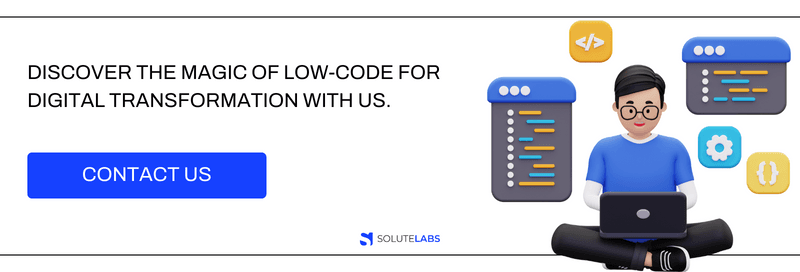Ever wondered how businesses modernize themselves in the digital age? How do they create those amazing apps and user-friendly websites? Well, here's a little secret: it all revolves around something called "low-code."
Think of it like constructing a digital universe with building blocks – that's what low-code does! If you're curious about how low-code can bring your ideas to life in the digital realm, if the terms "easy" and "fast" in technology make you intrigued, and if you're eager to explore the world of digital transformation, you're in the perfect spot! Let's embark on a journey to explore the enchanting power of low-code together and witness how it's revolutionizing the business world.
Understanding Low-Code Development
In the world of technology, there's a term you might have heard buzzing around: "low-code development." Don't let the jargon scare you – it's actually a pretty cool concept that's making a big impact on how businesses go digital. Let's break it down and explore what low-code is all about.
Principles of Low-Code Development
Imagine you want to build a digital tool, like a mobile app or a website. Traditionally, this could be a complex and time-consuming process. But with low-code development, things get much simpler. Low-code is like having a magic toolbox filled with pre-built parts and tools. Instead of starting from scratch and writing every line of code, you use these ready-made parts to put together your digital creation.
The principles of low-code development revolve around speed and simplicity. It's designed to make creating digital things easier and faster, even if you're not a coding expert. Think of it as a way to empower not only professional developers but also people who might not have a deep coding background – these are often referred to as "citizen developers." Low-code platforms provide an environment where you can visually design your app or software using drag-and-drop elements, forms, and templates. This way, you focus more on what you want to achieve, and the technical details are taken care of behind the scenes.

Core Components and Features
Low-code platforms consist of several essential components and features that make the development process smooth. These include:
Visual Interface:
Low-code platforms offer a user-friendly interface where you can design your digital solutions using visual elements. This allows you to see how your app will look and behave as you build it.
Reusable Templates:
Imagine you're baking cookies. Instead of measuring every ingredient from scratch, you can use a cookie dough mix. Similarly, low-code platforms provide pre-designed templates for various functionalities like forms, databases, and user interfaces. This significantly accelerates the development process.
Integration Tools:
Businesses often use multiple software systems. Low-code platforms come with tools to connect different systems together, creating a seamless experience for users and saving time for developers.
Flexibility and Scalability of Low-Code Platforms
One of the impressive aspects of low-code is its flexibility. It's not limited to small projects; it's capable of managing large and complex applications as well. As your business grows and your digital needs change, low-code can adapt. It's like having a set of building blocks that you can rearrange and expand upon as needed.
Low-code platforms also make scaling up (or down) easier. Let's say your app becomes really popular and lots of people start using it. Low-code's flexible architecture allows you to adjust the app's performance and capacity without tearing everything down and starting over.
In simple terms, low-code development aims to make digital transformation easy and effective. Think of it as a hidden shortcut for creating digital tools that match the rapid pace of technology. Now that we've got the basics of what low-code is and how it functions, let's dive into why it's a game-changer for businesses embracing digital transformation.
Key Benefits of Low-Code for Digital Transformation
When it comes to digital transformation, speed and efficiency are the name of the game. This is where low-code development steps in with its supercharged capabilities. Let's delve into the key advantages that low-code brings to the table in accelerating digital transformation.
1. Rapid Application Development
Time is money, and in the fast-paced digital world, getting your applications up and running quickly can give you a competitive edge. Low-code development turbocharges this process. With its ready-made components and user-friendly interface, you can assemble applications like building blocks. This means you can go from an idea to a functional app in record time.
2. Enhanced Collaboration between Business and IT
Traditionally, there's been a gap between business teams and IT departments. Low-code bridges this gap by providing a common ground where both groups can collaborate effectively. Business professionals can communicate their requirements using visual tools, while IT experts can fine-tune the technical aspects. This alignment ensures that the final product meets business needs while also being technically sound.
3. Reduction in Development Time and Costs
Developing software applications from scratch can be a time-consuming and costly affair. Low-code flips the script. By utilizing pre-built elements and templates, development time is significantly slashed. This also translates to reduced costs since you're not reinventing the wheel with every project. The efficient use of resources is a major win for businesses aiming to transform digitally without breaking the bank.
4. Integration of Legacy Systems
Many businesses have older systems and software that they can't just toss aside during digital transformation. Low-code comes to the rescue here as well. It can seamlessly integrate with existing legacy systems, breathing new life into them. This means you can leverage your previous investments while modernizing your digital ecosystem.
5. Improved Customer Experience
Low-code empowers businesses to create user-friendly applications that cater to customer needs. Whether it's a smoother e-commerce platform or an intuitive mobile app, low-code's quick development cycle ensures that you can roll out customer-centric solutions rapidly. This responsiveness can lead to happier customers and stronger brand loyalty.
Also, Read: Application Modernization - Create Future-Ready Organizations
Low-Code and Agility in Digital Transformation
In the fast-changing business world, being able to quickly change and come up with new ideas is really important. This is especially true when it comes to digital transformation – where being fast and adaptable is key. That's where low-code development comes in. It's like a spark that helps businesses welcome change and adjust to the ever-changing business world. In this part, we'll see how low-code helps businesses be quick and adaptable in their journey of digital transformation.
Adapting to Rapidly Changing Business Landscapes
Business landscapes today are in a constant state of flux. New technologies emerge, customer preferences shift, and market trends evolve. Low-code development provides a powerful mechanism for businesses to keep up. Its modular approach allows for quick adjustments and enhancements. Whether it's integrating a new payment gateway to your e-commerce platform or adding a chatbot for customer support, low-code lets you adapt without starting from scratch.
Quick Prototyping and Iteration of Solutions
In the past, developing a software solution often involved lengthy planning and execution phases. Low-code flips this script by enabling rapid prototyping. You can create a basic version of your application quickly, allowing stakeholders to visualize the concept early on. This not only speeds up decision-making but also facilitates faster iterations based on feedback. The ability to iterate rapidly means you can refine your digital offerings based on real-world insights.
Addressing Immediate Business Needs Efficiently
Business needs can arise unexpectedly. Whether it's a sudden surge in online orders or the need for a new internal communication tool, low-code shines in addressing these urgent requirements. Its drag-and-drop interface and pre-built components enable you to create functional solutions in a fraction of the time it would take with traditional development. This agility to respond promptly can be a game-changer, helping you seize opportunities and overcome challenges swiftly.
Also, Read: 6 Key Digital Transformation Strategies for Your SMBs
Overcoming Challenges with Low-Code
While low-code development offers a plethora of benefits, it's not without its challenges. Let's explore these challenges and discover how businesses can navigate them to make the most of the low-code approach.
1. Balancing Customization with Platform Limitations
One of the key challenges with low-code lies in finding the sweet spot between customization and the limitations of the platform. While low-code platforms provide pre-built components, there might be instances where you need a highly specialized feature that the platform doesn't offer out of the box. Striking the right balance is essential – harnessing the platform's efficiency while carefully considering when and how to extend its capabilities through custom code.
2. Ensuring Scalability for Large Enterprises
For large enterprises with complex operations and a massive user base, scalability is paramount. Low-code platforms that work seamlessly for smaller projects might face scalability challenges when handling substantial volumes of data and users. Businesses need to choose a low-code solution that can grow alongside their needs. This involves assessing the platform's performance under heavy loads and ensuring it can handle the demands of a larger-scale deployment.
3. Integrating Complex Functionalities
Modern applications often require intricate functionalities that go beyond the basics. While low-code platforms excel at rapid development, integrating complex features can be a puzzle. This could involve intricate workflows, advanced analytics, or intricate third-party integrations. Overcoming this challenge requires a deep understanding of both the low-code platform's capabilities and the specific requirements of your application. In some cases, a hybrid approach that combines low-code and custom code might be necessary.
Also, Read: 10 Digital Transformation KPIs and Metrics to Track in 2023
Future Trends in Low-Code Development
As technology keeps getting better and better really fast, the way we use low-code is changing too. Let's look at the cool things that are happening and how they're going to shape the future of low-code and how it helps make digital changes happen.
1. Evolution of Low-Code Platforms
Low-code platforms are on a trajectory of continuous improvement. Expect to see even more intuitive and feature-rich interfaces that empower developers of all backgrounds to create sophisticated applications. The visual design capabilities are likely to become even more robust, enabling the creation of complex user interfaces and interactions with minimal coding. Additionally, low-code platforms will likely focus on enhancing collaboration features, enabling teams to work seamlessly across geographical boundaries.
2. AI and Automation Integration
Artificial Intelligence (AI) and automation are becoming integral to business operations. In the world of low-code development, this means incorporating AI-driven features that simplify decision-making and enhance user experiences. AI-powered tools could assist developers in optimizing application performance, suggesting design improvements, and even predicting potential issues. Moreover, automation will streamline various aspects of the development lifecycle, from testing to deployment, reducing manual effort and human error.
3. Role of Low-Code in Emerging Technologies (e.g., IoT, AI)
Low-code isn't limited to just building applications; it's a driving force behind integrating emerging technologies. IoT and AI, for instance, are transforming industries. Low-code platforms are positioned to play a crucial role in stitching these technologies together. Imagine creating an application that connects smart devices seamlessly using IoT or utilizing AI models to extract insights from data—all with the speed and efficiency that low-code offers.
Conclusion
In the world of technology that's always changing, making big shifts is about being creative and flexible. That's where low-code development steps in – it's like a supercharger that helps businesses not only catch up but also speed ahead in their digital transformations.
From rapid application development and enhanced collaboration to cost-efficiency and seamless integration, low-code has proven its worth across diverse industries.
As we've explored, low-code empowers businesses to navigate challenges, respond to changing landscapes, and embrace emerging technologies with agility. It's a bridge between business needs and technology solutions, accessible not only to seasoned developers but also to citizen developers eager to contribute.
Digital Transformation with SoluteLabs
If you're ready to embark on a transformative journey, look no further than SoluteLabs. Our expertise in digital transformation and low-code development positions us as a partner of choice. We specialize in harnessing the power of low-code and no-code platforms to craft tailored solutions that align with your unique business goals.
Whether you're envisioning a customer-centric application, a seamless legacy system integration, or a breakthrough innovation, SoluteLabs is here to guide you. Our commitment to innovation, collaboration, and delivering exceptional user experiences makes us the perfect collaborator for your digital transformation aspirations.
Explore the future with confidence. Partner with SoluteLabs to elevate your digital transformation journey through the limitless potential of low-code and no-code development.
Ready to Transform? Contact SoluteLabs Today!

